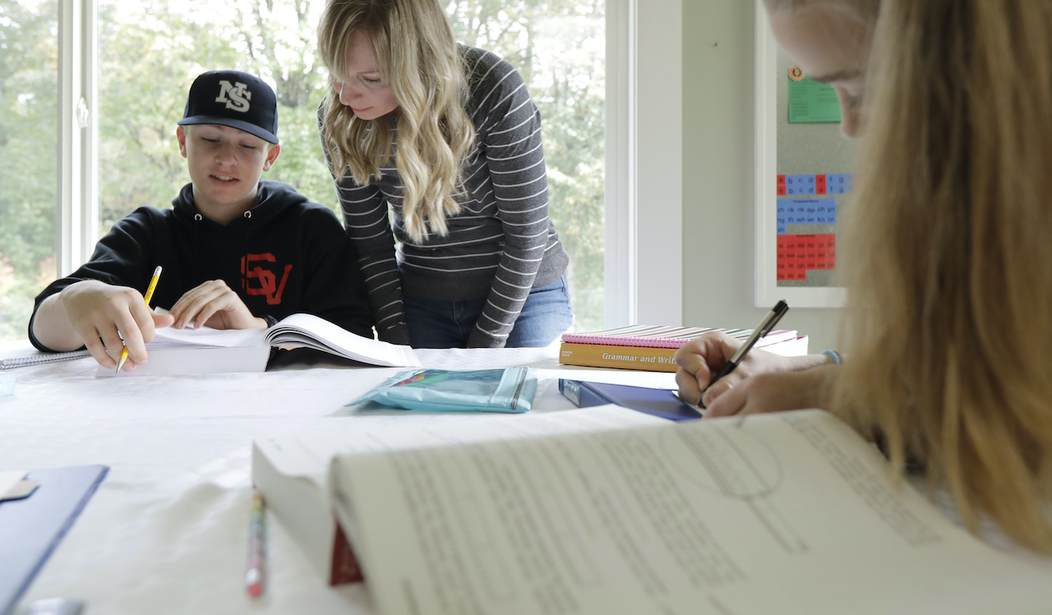As stay-at-home orders have been issued across the country to contain the spread of coronavirus, many parents have found themselves in a role they never anticipated—serving as teacher.
Log on to any social media site and you are bound to run into parents sharing their wild tales from the sudden adjustment. And while it's been a shock to some, according to a recent survey by EdChoice, a majority now have a more favorable view of homeschooling, with 28 percent saying they have a "much more favorable" opinion and 24 percent having a "somewhat more favorable" view.
This is welcome news to the Home School Legal Defense Association, the oldest and largest advocate for homeschool freedom in America, which has seen a "tremendous amount of interest" recently, Jim Mason, HSLDA's Vice President of Litigation and Development, told Townhall.
To assist parents during this time of transition, HSLDA has created a resource called MomPossible.org to give parents the "tools, tips, and practical resources to create a positive growth-oriented school-at-home environment," according to its website.
Prior to the pandemic, the number of homeschooled children in the U.S. stood at roughly 1.8 million, according to the National Center for Education Statistics—a number that could grow after school lockdowns end.
Recommended
"We hope in the long term many people being introduced to the idea of teaching their kids at home will actually discover the joy that brings, and for those interested, we'll be providing more practical help on how to move from being from home in this unexpected time to actually choosing to homeschool in the future," Mason said.
"There are a lot of people who will take a second look at homeschool who might not have otherwise," he added, noting the increased interest HSLDA's educational consultants are seeing.
Contrary to the stereotype that the homeschooling community consists mostly of a fundamentalist religious population, the movement is quite diverse, with parents choosing this education option for a variety of reasons.
According to a 2017 National Center for Education Statistics study, the highest percentage of homeschooled students had parents who listed a concern for the school environment, which includes safety, drugs, or negative peer pressure, as the reason for choosing to homeschool. Other reasons dealt with desires to provide moral and religious instruction, a non-traditional approach to their child's education, dissatisfaction with academic instruction, because a child has special needs, and more.
"Lots and lots of people from all kinds of ideological backgrounds choose to homeschool today," Mason explained, noting the rise in upscale urban families who are making the decision to homeschool, as well as an increasing number of black, Asian, and Hispanic families who are seeing homeschooling as a viable education option for their children.
And still, despite the increased interest and the fact that homeschooling has been legal in all 50 states for more than 30 years, there are always the outspoken detractors. Most recently, criticism has been loudest from Harvard Law School Professor Elizabeth Bartholet and a now-cancelled summit at the university that was supposed to discuss the "controversial practice" of homeschooling.
In her Arizona Law Review article, Bartholet "recommends a presumptive ban on homeschooling, with the burden on parents to demonstrate justification for permission to homeschool."
Mason narrowed such antagonism toward homeschooling down to "competing worldviews."
Bartholet's arguments present "the statist view of the parent-child relationship," he explained, which is most challenged by homeschooling.
"Homeschoolers have completely detached themselves from the oversight and control of the bureaucrats, not completely, obviously, but the notion that parents have the audacity to take on the raising, nurturing, and educating of their own children is an affront to the statist worldview," he said.
Indeed, HSLDA has been protecting homeschooling rights in courts and legislatures from such statist views since its inception more than 35 years ago.
HSLDA's team of lawyers are constantly monitoring legislation in all 50 states and from the federal government. Just last month, they argued a case in the Supreme Court of Virginia after a local school district passed a policy that added evidentiary requirements onto an existing statewide homeschooling statute, going so far as to threaten a family with prosecution for not complying.
"We asked them to strike that policy down," he said.
"There are legislative threats and then there are local bureaucratic threats," Mason added. "It's not uncommon that all over the country right now local school districts are attempting to impose requirements on homeschool that are not lawful."
While HSLDA doesn't always go to court over these issues, they do always push back, he said.
"Homeschooling is a challenging, fulfilling opportunity to experience the joy of watching your own children learn," Mason said.
And in a free society such as ours, no one ought to be able to trample on that right.























